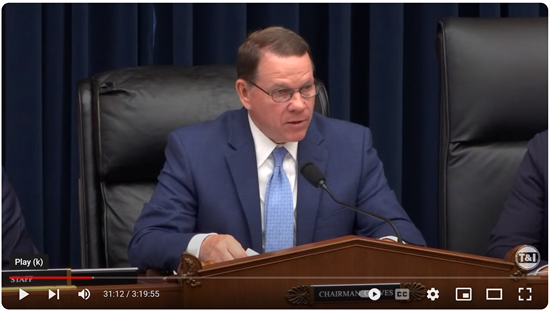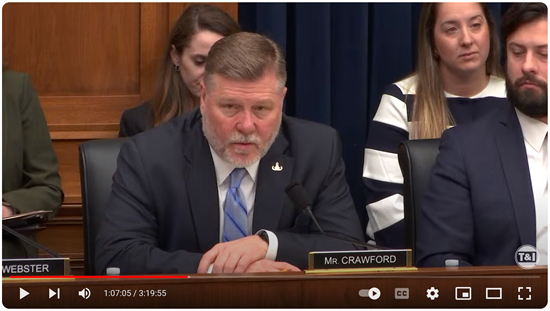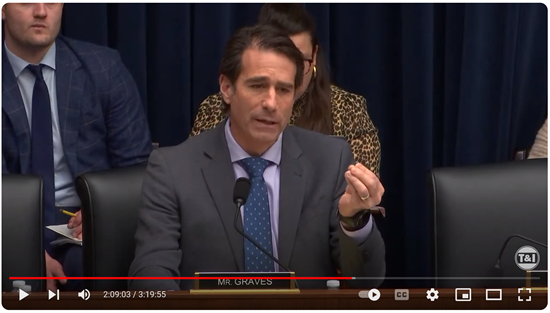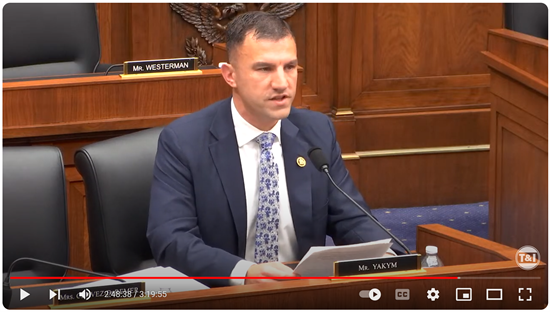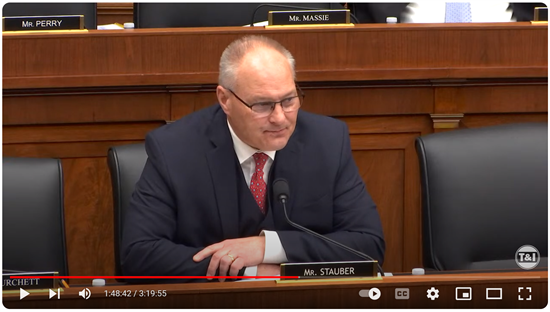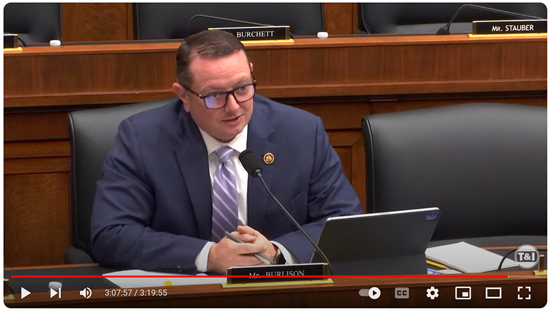Press Releases
Hearing Highlights Difficulties and Delays in DOT Discretionary Grant ProcessesDuring a March 7th Transportation and Infrastructure Committee hearing on U.S. Department of Transportation (DOT) competitive discretionary grant programs, witnesses representing state, local, and private industry entities related their experiences navigating the grant program application processes. Witnesses highlighted the various challenges they regularly encounter that too often make the grant process unnecessarily difficult and confusing, create costly project delays, favor cities over small and rural communities, and overly focus on the Biden Administration’s added criteria for climate, equity, and environmental justice. Transportation and Infrastructure Committee Chairman Sam Graves (R-MO) questioned Audrain County, Missouri Presiding Commissioner Alan Winders, testifying on behalf of the National Association of Counties, about challenges his county has faced when applying for RAISE grants for Highway 54 improvements. Winders said the county has been unsuccessful in its grant applications for six years, noting the inconsistent determinations and changing grant criteria present a “moving target.” Watch:
Highways and Transit Subcommittee Chairman Rick Crawford (R-AR) raised his continued concerns about DOT exceeding its statutory authority in issuing a final rule requiring a greenhouse gas (GHG) performance measure – a requirement rejected during the development of the Infrastructure Investment and Jobs Act (IIJA). Florida Department of Transportation Secretary Jared W. Perdue agreed that DOT exceeded its authority and that the rule will place significant burdens on the states. Watch:
Aviation Subcommittee Chairman Garret Graves’ (R-LA) questions to the witnesses raised several key points, including how the increased funding provided under IIJA has been consumed by inflation, the lack of transparency in grant processes, and the impacts of the Biden Administration’s addition of Justice40 Initiative criteria to infrastructure grant applications. Watch:
Water Resources and Environment Subcommittee Chairman David Rouzer (R-NC) discussed his and other states’ experiences with DOT grant award delays that lead to project cost overruns – hundreds of millions of dollars in some cases. Perdue agreed that “this is not an efficient, effective way to deliver infrastructure,” leading some local stakeholders in his state to not pursue available resources and risk potential cost increases. Watch:
Railroads, Pipelines, and Hazardous Materials Subcommittee Chairman Troy Nehls (R-TX) followed up Rep. Rouzer’s line of questioning by asking Perdue who bears the costs of overruns created by DOT grant delays, and whether that has led to the cancellation of projects that became too financially burdensome. Watch:
Rep. Rudy Yakym (R-IN) also raised the issue of grant agreement delays and ongoing inflationary pressures on project costs, citing one locality in his district that returned grant funding after DOT delays resulted in project cost increases. American Short Line and Regional Railroad Association President Chuck Baker noted similar problems with delays and transparency in the Consolidated Rail Infrastructure and Safety Improvements (CRISI) Program, which have gotten worse as the program has gotten bigger. Watch:
Rep. Pete Stauber (R-MN) asked the panel about difficulties for smaller local governments, compared to larger cities, when applying for DOT competitive grants. Winders highlighted the disadvantages many small and rural communities face due to their comparative lack of resources and the complex project criteria and processes that tilt the competitive grant process in the favor of larger cities. Watch:
Rep. Eric Burlison (R-MO) highlighted electric vehicle (EV) charging infrastructure grants, and asked whether that federal funding was appropriate. Perdue replied that the private industry has done well in supplying various fuels for a varied vehicle fleet, and that “it should not be any different for the power it takes to charge electric vehicles.” Watch:
Click here for more information from this hearing, including the full video and all witness testimony. |







